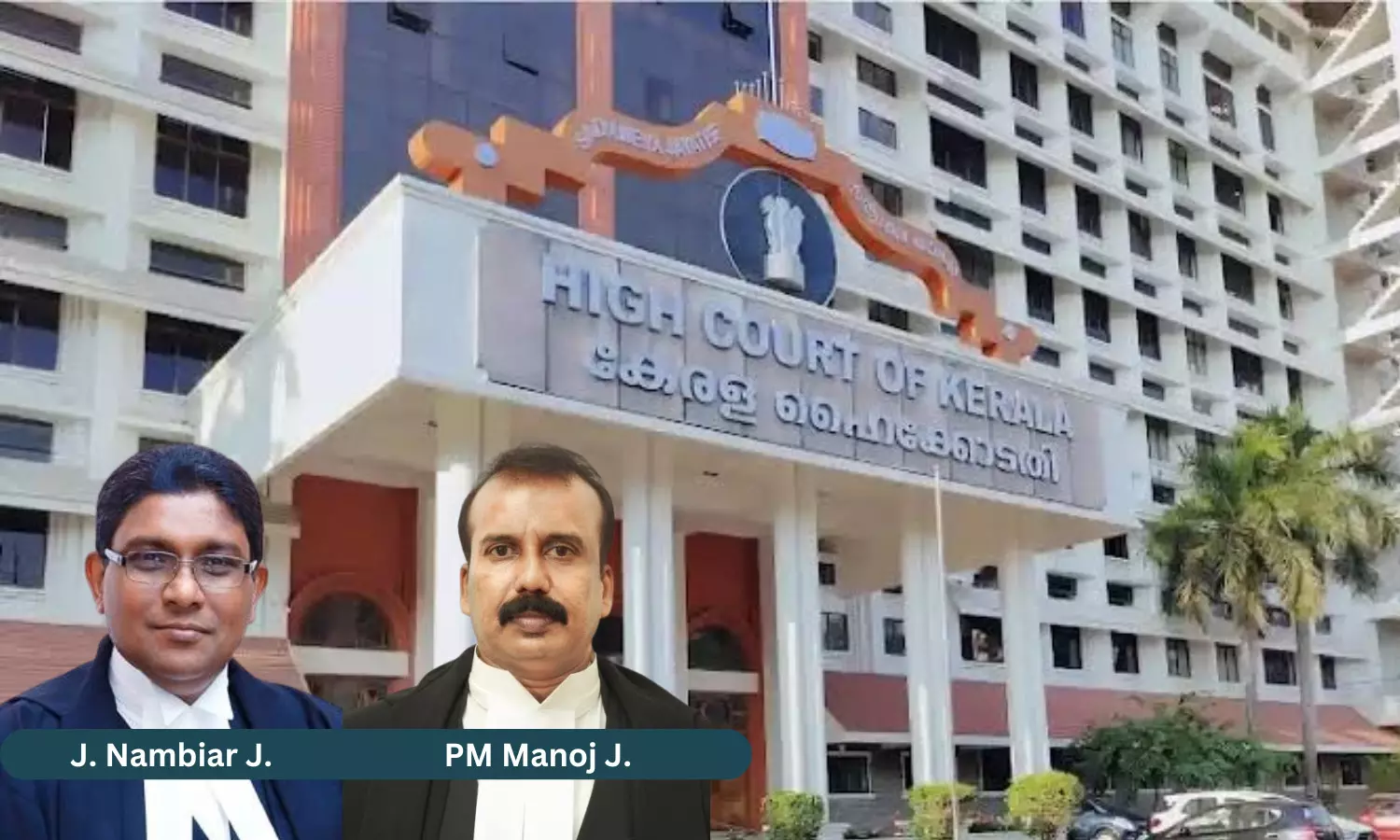
Justice A.K. Jayasankaran Nambia, Justice P.M. Manoj Kerala High Court
Sale Certificate, At The Time Of Its Issuance, Does Not Create Or Transfer Any Right Or Liability In Praesenti; Doesn't Attract Stamp Duty: Kerala High Court
 |
|The Court dismissed the State’s appeals and held that Sub-Registrars cannot demand stamp duty for merely filing sale certificates issued after public auctions conducted by revenue authorities and other authorised bodies.
The Kerala High Court has held that a sale certificate issued to an auction purchaser pursuant to a court- or authority-conducted public auction does not attract stamp duty under the Kerala Stamp Act, 1959 at the time of its issuance. It ruled that such a certificate is not an “instrument” under Section 2(j) of the Act and that Sub-Registrars have no authority to insist on payment of stamp duty for merely filing a copy under Section 89(4) of the Registration Act, 1908.
A Division Bench of Dr. Justice A.K. Jayasankaran Nambiar and Justice P.M. Manoj observed, “A sale certificate, at the time of its issuance to an auction purchaser, does none of the above since it only records the fact of a transaction of sale having been concluded between the parties, without going further to adjudicate or express any opinion on the rights or liabilities of the parties to the said transaction.”
The Court added, “We are therefore clear in our minds that, at the time of its issuance to an auction purchaser, a sale certificate cannot be seen as an ‘instrument’, and consequently will not attract the levy of stamp duty under the Kerala Stamp Act.”
Special Government Pleader Mohammed Rafiq appeared for the Appellants, while Advocate Philip T. Varghese represented the Respondents.
Brief Facts
The appeals arose from multiple writ petitions filed by auction purchasers and financial institutions, who were informed by Sub-Registrars that stamp duty must be paid on the original sale certificates issued to them after public auctions. These certificates were issued by authorities conducting sales for the recovery of dues under law.
When the sale certificates were submitted to Sub-Registrars for filing under Section 89(4) of the Registration Act, the registering authorities declined to act unless stamp duty was paid, citing Article 16 of the Kerala Stamp Act. The Petitioners contended that such a demand was without legal basis, and the learned Single Judge accepted their contentions. The batch of writ appeals was filed by the State of Kerala and various registering authorities challenging those judgments.
Reasoning of the Court
The Court examined the nature of a sale certificate and the definition of “instrument” under Section 2(j) of the Kerala Stamp Act. It noted, “A sale certificate, evidencing a sale that is already complete and concluded, does not ‘create’ or ‘transfer’ any right or liability in praesenti. It merely acknowledges what has already happened.”
The Bench observed that fiscal enforcement must occur under the machinery of the fiscal statute and not through powers conferred under a regulatory law like the Registration Act, stating, “The enforcement of the provisions of a fiscal legislation has necessarily to be through the machinery provided under that legislation, and not through the machinery provided under a general regulatory legislation.”
The Court rejected the State’s attempt to use the Registration Act to indirectly enforce stamp duty, and clarified the Sub-Registrar under Section 89(4) had a limited role.
The Bench noted that an auction purchaser may still voluntarily present the original certificate for registration. “A sale certificate, which is not an ‘instrument’ at the time of its issuance, can nevertheless metamorphose into one when its original is presented for registration before a registering authority”, it added.
The Court further noted that insufficient stamping only affects admissibility in evidence, not validity, referring to the Constitution Bench in In Re: Interplay between Arbitration Agreements and Stamp Act (2024), wherein it had been held that even if an instrument is insufficiently stamped, and is liable to be impounded, what is affected is only its admissibility in evidence and not its validity as the document that it purports to be.”
The Court held, “While the registering authority under the Registration Act cannot exercise his powers under Sections 33 or 34 of the Kerala Stamp Act in relation to the copy of a sale certificate that is sent to him for filing in terms of Section 89(4) of the Registration Act, even the original of the sale certificate concerned will not attract the levy of stamp duty under the Kerala Stamp Act, save in the exceptional circumstances when it qualifies to be an instrument as defined under the Kerala Stamp Act.”
Accordingly, the Court dismissed the writ appeals filed by the State, affirmed the Single Bench judgments, and directed the registering authorities to file the sale certificates without insisting on stamp duty, unless the original document is voluntarily submitted for registration by the purchaser.
Cause Title: The Revenue Divisional Officer, Adoor & Anr. v. Thomas Daniel (Neutral Citation: 2025:KER:53343)
Appearance
Appellants: Special Government Pleader Mohammed Rafiq
Respondents: Senior Advocate George Poonthottam; Advocates Philip T. Varghese, Thomas T. Varghese, Achu Subha Abraham, V.T. Litha, K.R. Monisha, Shiju Varghese, Jaison Joseph, Jimmy Joseph, Archana Ramanan, Veena Vallikanthan, Zakeer Hussain, Mohan Jacob George, Peeyus A. Kottam, Leo George, P. Paulochan Antony, K. Janardhana Shenoy, Nisha George, Asp. Kurup, Sadchith P Kurup, C.P. Anil Raj, Siva Suresh, B. Sreedevi, Athira Vijayan, B. Vinod, Pradeesh Chacko